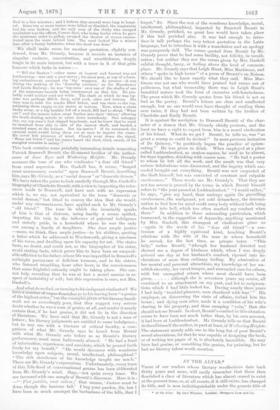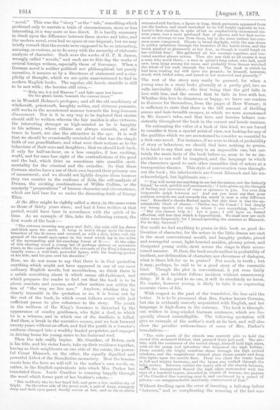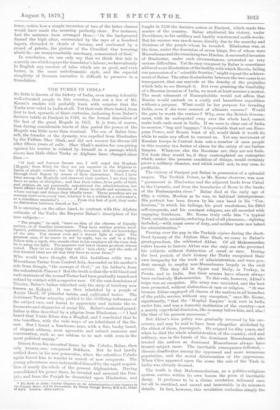AT THE ALTAR.*
THOSE of our readers whose literary recollections date back thirty years and more, will easily remember that there then flourished a clasel of literature which has almost ceased to exist. at the present time, or, at all events, if it still exists, has changed its title, and is now indistinguishable under the generic title of • At the Altar. By Carl Werner. London : Sampson Low and Co.
"novel." This was the " Story " or the" tale," something which professed only to narrate a train of circumstances, more or less interesting, in a way more or less direct. It is hardly necessary to dwell upon the difference between these stories and tales, and the modern novel, even had we space at our disposal ; but we may briefly remark that the events were supposed to be so interesting, amusing, or curious, as to do away with the necessity of elaborate analysis of character. Such were the works of G. P. R. James, wrongly called " novels," and such are to this day the works of several foreign writers, especially those of Germany. When a German novel is neither political nor philosophical, but purely narrative, it amazes us by a directness of statement and a sim- plicity of thought, which we are quite unaccustomed to find in modern English books. The regular, old, heroic straddle is still to be met with ; the heroine still cries,—
" 'Help me, k-y-ind Heaven!' and falls upon her knees On the green baize, beneath the canvas trees,"
as in Wendell Holmes's prologue; and all the old machinery of witchcraft, priestcraft, haughty nobles, and virtuous peasants,
still works in the accustomed manner towards the long-foreseen denouement. Nor is it in any way to be deplored that stories
should still be written wherein the fair maiden is also virtuous, the interesting stranger as high-minded as he is haughty in his actions ; where villains are always cowards, and the brave in heart, are also the attractive to the eye. It is well that we should be odeasionally reminded of what was the simple faith of our grandfathers, and what were their notions as to the behaviour of their sons and daughters; that we should look back, if only for half-an-hour, on a less complex, if less exciting, world, and for once lose sight of the contradictions of the good and the bad, which drive us sometimes into maudlin Eenti- mentality for the criminal and the swindler. So that these German stories have a use of their own beyond their primary one of amusement, and we should not lightly despise them because
they .run counter to the realising of Zola, the self-analysis of Dumas, the exciting combinations of Wilkie Collins, or the masterly " preparations " of human character and circumstance,
which are laid bare for us under the dissecting-knife of George Eliot.
At the Altar might be rightly called a story, in the same sense as those of thirty years since ; and had it been written at that
period, would have been in accordance with the spirit of its time. As an example of this, take the following extract, the first words of the book :—
"The autumn morning was grey and dull ; the mist still lay damp and thick upon the earth. It hung in heavy drops upon the heavy branches of the fir-trees, and covered, as with a thin, white veil, the ground of the small open space in the wood which lay in the midst of the surrounding and far-reaching forest of 5—. At the edge of this clearing stood a young lad of perhaps sixteen or seventeen years, in the coarse uniform which tho servants of the King's foresters usually wore ; a well-knit, powerful figure, with his hunting-pocket at his side, and his gun over his shoulder."
Now, we do not mean to say that there is in that quotation anything which might not have appeared in one of our most
ordinary English novels, but nevertheless, we think there is a subtle something about it which seems old-fashioned, and which prepares the reader to find out that the book is to be about combats and rescues, and other matters not within the ken of "the way we live now." Anyhow, whether this be dearly traceable in the quotation or no, it is borne out by the rest of the book, in which event follows event with just sufficient pause to give coherence to the story. The youth in the uniform of the King's foresters is disturbed by the appearance of sundry gentlemen, who fight a duel, to which he is a witness, and in which one of the duellists is killed. And then, a break in the narrative occurs, and we look forward twenty years without an effort, and find the youth in a forester's uniform changed into a wealthy landed proprietor, and engaged in driving home his young sister to his fraternal roof.
Then the tale really begins. Mr. Gunther, of Debra, such is his title, and his sister Lucie, take up their residence together, having as their neighbours on one side of the estate, the power- ful Count Rhaneck, on the other, the equally dignified and powerful Abbot of the Benedictine monastery. How the heroine meets here the hero we will tell in the author's own words, or, rather, in the English equivalents into which Mrs. Parker has translated them. Lucie Gunther is roaming happily through the wood which forms part of her brother's estate,—
" But suddenly she lot her hand fall, and gave a low, sudden cry of fright. On the other side of the great rock, a pair of large, strangely deep and dark eyes gazed fixedly across at her, and as she in alarm
retreated still further, a figure in long, black garments appeared from out the bushes, and stood stretched to its full height opposite to her. Lucie's first emotion, in spite of her so emphatically-announced six- teen years, was a most profound fear of ghosts, and her first move- ment an attempt to run from them, but in the same instant her cora- mon-sense conquered. Ghosts in broad daylight, while the sun shone in golden splendour through the branches of the beech-trees, and the brook plashed so pleasantly at her foot, as though it would laugh at her childish fear ! She gathered all her courage together, and ven- tured another glance across. Then sho saw that at all events it was a man who stood there,—a man in priest's long robes, who had, until now, been lying among the moss, and probably from thence watched the whole of her walk through the torrent. Tho book in which he had been reading lay still upon the ground ; he himself, however, stood, with folded arms, and gazed at her unmoved and gloomily."
The rest of the story may easily be guessed, for when a young man in a story looks gloomily at a pretty girl, two re- sults inevitably follow,—the first being that the girl falls in love with him, and the second that he falls in love with her. Whether this love be disastrous or happy, we leave our readers to discover for themselves, from the pages of Herr Werner ; it is sufficient to state that there is the full amount of thrilling scenes and hair-breadth escapes, to which we were accustomed in Mr. James's tales, and that hero and heroine behave con- sistently throughout the book in the correct and heroic manner.
On estimating the value of a book of this kind, we are forced to consider it from a special point of view, not looking for any of the qualities which we are accustomed to consider as essential to first-rate novel. For instance, if we were to think of probability of story or behaviour, we should find here nothing to praise. It is hard to say that any story is an impossible one, but cer- tainly the main facts of the book before us, seem to be as im- probable as can well be imagined, and the language in which the characters speak to each other resembles that of actors at a transpontine theatre. This style of conversation runs through- out the book ; the interlocutors are Count Rhaneck and his un- acknowledged, but legitimate son :—
"'You will never see anything in me but the patron, not the fatherly friend,' he said, quickly and passionately; have given up the thought of finding any movement of trust or openness in you. For over this impassable gulph between us ! And yet you must say that your position towards me and towards the world is now a very different ono.' Benediot's cheeks fleshed again, but this time it was the un- mistakable blush of shame.—' Pardon me, Sir Count ! I feel deeply my wrong against the man to whom I owe everything, but—
But you cannot help it ! Let it pass ; I will have no forced affection, still less that which is hypocritical. We shall now see each other more frequently, for I intend spending the summer at Rhaueek. For to-day, farewell !' "
Nor could we find anything to praise in this book as good de- lineation of character, for the actors in the little drama are cast in the most conventional mould, and haughty prelate, proud and revengeful count, light-hearted maiden, gloomy priest, and dissipated young noble, strut across the stage in their accus- tomed manner. If, then, the book excels neither in probability of incident, nor delineation of character, nor cleverness of dialogue, what is there left for us to praise ? Not much, in truth ; but it may, perhaps, be said to be a good story of the romantic kind. Though the plot is conventional, it yet runs fairly smoothly, and incident follows incident without unnecessary delay. If it do good to no one, it will do absolutely no harm. No reader, however young, is likely to take it as expressing accurate views of life.
With respect to the part of the translator, the less said the
better. It is to be presumed that Mrs. Parker knows German, but she is evidently scarcely acquainted with English, and her language is high-flown in the extreme. The book is through- out written in long-winded German sentences, which are fre- quently almost unintelligible. The following quotation will give an example of the author's work at its best, and will also show the peculiar awkwardness of some of Mrs. Parker's translations :—
"The wide porch of the church was scarcely able to hold the crowd that streamed thither, that pressed there pall.ma. The pre- late, with the assistance of the united clergy, himself held high mass, with all the pomp and splendour that beseemed the high holiday. From outside, the bright sunshine shone through the high arched windows, and the magnificent stained glass threw purple and deep blue lights upon the marble floor. From the choir the music burst in full and mighty harmony, and the hymn was wafted through the lofty. arches. Between rustled tho heavy silk of the church banners, antra the background flamed the high altar, surrounded with the rays of a hundred tapers, shrouded in clouds of incense, the picture of the Crucified One towering over it, and onviroeed by a crowd of priests,—an unapproachable sanctuary, consecrated of God,"
Without dwelling upon the error of inserting a full-stop before "between," and so complicating the meaning of the last sen- tence, notice how a simple inversion of two of the latter clauses: would have made the meaning perfectly clear. For instance, had the sentence been arranged thus In the background flamed the high altar, surrounded by the rays of a hundred tapers, shrouded in clouds of incense, and environed by a crowd of priests, the picture of the Crucified One towering above it,—an unapproachable sanctuary, consecrated of God.'
In conclusion, we can only say that we think this tale is scarcely one which repays the translator's labour; we have already in English any number of tales which are as good, and even better, in the same melodramatic style, and the especial simplicity of German narrative is difficult to preserve in a translation.




































 Previous page
Previous page